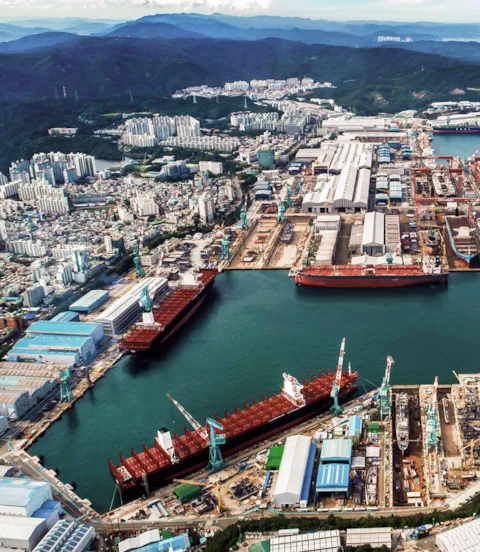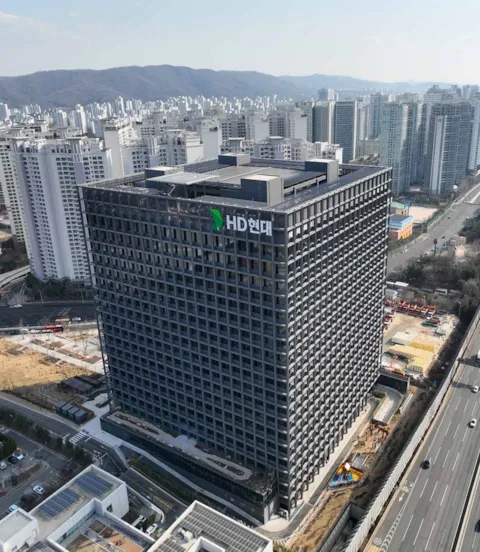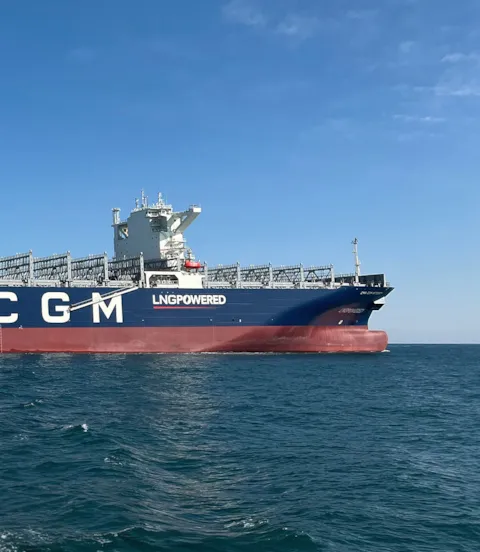From heavy industries to high-tech: Hyundai turns the page
In an increasingly complex world with multiple challenges, HD Hyundai has decided to transform from a shipbuilder to a high-tech-focused “future builder” company developing solutions for decarbonization and digitalization.
When Hyundai Heavy Industries Group changed its name to HD Hyundai in December 2022 in the context of its 50th anniversary celebrations, the intention was to highlight a major change of focus. The recent opening of the company’s new Global R&D Center (GRC) in the Pangyo region, Korea’s “Silicon Valley”, was another manifestation of this strategic shift: under the leadership of CEO Kisun Chung, the grandson of Hyundai Group founder Ju-yung Chung, HD Hyundai has seen a transformation from a heavy industries corporation to an enterprise with a strong focus on technology development. Instead of being perceived as a shipbuilder, says Chung, HD Hyundai wants to lead the industry as a ‘future builder’.

Interdisciplinary R&D for holistic solutions
Research and development play a much greater role in HD Hyundai’s portfolio of activities today as the world’s key challenges call for a holistic approach to solution-finding. Renewable energy, carbon reduction, autonomous navigation, alternative fuels, electric propulsion – the list of major research projects at the new GRC is long. Working across disciplines and sharing expertise between all the different domains will drive learning and collaboration, says Chung. In the history of a company that started as a construction firm, accepted its first order to build two 260,000-tonne oil tankers in 1972 without even having a shipyard yet, before eventually becoming the world’s largest shipbuilder, this marks yet another major milestone.
Focus on digital and green technologies
In January 2023, Chung announced an ambitious vision for HD Hyundai, dubbed “Ocean Transformation”. It homes in on cutting-edge technologies to address the industry’s main topics. “As we explore new future technologies, we find that there are two main pillars: one is digital technology, especially AI, and the other is green technology,” the CEO explains.
Digital technologies such as AI, big data or cloud computing help HD Hyundai maximize efficiency and create new solutions, Chung adds: “You’ll find the best example in our ‘Future Shipyard’ initiative where the latest technologies are making our production facilities much safer and more efficient. The development of our smart ship solutions is another great example. We also completed the world’s first autonomous crossing of the Pacific Ocean last year – with significant improvements in both fuel efficiency and the reduction of greenhouse gases.” HD Hyundai’s autonomous navigation system had previously received an Approval in Principle (AiP) from DNV.

Developing tomorrow’s tri-fuel ship engine
As for green technology, HD Hyundai has taken the lead in many fields, from scrubbers to combustion engines for alternative fuels, and through to fuel cells and even nuclear energy, Chung points out. More than half of the current worldwide orders for methanol-powered ships have been placed with his company and nearly all of them will be fitted with engines made by HD Hyundai.
“We are also developing an LNG and hydrogen tri-fuel engine,” says Chung. “We have already demonstrated that our LNG dual-fuel HiMSEN engine runs perfectly well using up to 35% hydrogen fuel and we plan to have a 100% hydrogen-powered tri-fuel HiMSEN engine by 2025.” DNV has already granted an AiP for the tri-fuel engine.

Hydrogen makes zero-carbon achievable
In March 2021, HD Hyundai Group unveiled its “Hydrogen Dream 2030” roadmap as part of the group’s plans for future growth with a strong focus on decarbonization, a challenge for all industries, stresses Chung. Whilst today’s eco-friendly newbuilds are much more efficient than older vessels, there is more that can be done, and as the world’s leading shipbuilder, HD Hyundai is determined to advance technology on all fronts, he says: “Hydrogen is only one of many, many solutions we’re working on. There is a whole range of alternative fuels like ammonia, methanol and LNG, as well as other technologies that reduce greenhouse gases, such as hull optimization, shaft generators, air lubrication, wind-assisted propulsion, fuel cells, and carbon capture.” To this end, HD Hyundai and DNV are currently working on a liquefied CO2 carrier design in a joint development project.
Whilst cutting greenhouse gas emissions is especially challenging for the shipping industry, Chung is convinced that zero-carbon emissions can be achieved by using hydrogen as a fuel. “Of course, using hydrogen as a fuel is a big engineering challenge. Our profound understanding and experience in cryogenic technology will play a critical role in making these clean energy sources operational in the future,” he assures.

Retrofitting the fleet in service is key
But developing state-of-the-art decarbonization technology for newbuilds alone will not be enough to reach net-zero, insists Chung: retrofitting existing tonnage is just as important. This is why Hyundai Global Service dedicates significant resources to upgrading engines and retrofitting equipment so that the fleet in service can meet the latest environmental standards, as well.
Global collaboration and talent development unlocks potential
To expand into next-generation energy technologies like fuel cells, small modular rectors (SMRs) and offshore wind, HD Hyundai is partnering with an entire range of world-leading innovators and international organizations. “We are ready to work with anybody and everybody who has the expertise we need for the future. In our fight against climate change, I believe that open innovation based on global collaboration is the only way forward,” says Chung.
Another critical prerequisite to achieving all these ambitious goals is the ability to attract and retain qualified experts and to cultivate talent – not an easy task in a highly competitive marketplace. “Building a strong team of ‘future builders’ is at the top of my agenda,” says Chung. “We have found that one key driver in attracting top talents is the globalization of our organization and operation.”

Partnering with academia in many countries
Strengthening its research and development base in Europe is one of HD Hyundai’s globalization strategies. “We recently opened an R&D centre in Düsseldorf, Germany, to serve as a regional hub for R&D collaboration and talent acquisition,” he explains. Other recent initiatives to strengthen ties with the academic world have included a highly successful joint research project on vessel propulsion systems with Aachen University of Technology, and a collaborative project with the University of Edinburgh on carbon capture and storage. “With Seoul National University in Korea, we established an entire graduate programme on Smart Ocean Mobility,” says Chung. “Joint projects like these provide top future talents with great opportunities to work with HD Hyundai.” Beyond education, offering every employee favourable working conditions that allow them to thrive both professionally and personally is essential, stresses Chung.
Sustainability – a global challenge
DNV and Hyundai share the belief that collaboration and partnership across all industries is the only way to achieve true sustainability: “Sustainability really is a global issue,” emphasizes Chung. “I believe no single company or country can fully address this problem on their own. It will take the whole value chain working together. Everyone – shipbuilders like us, industry-standard bodies like DNV, shipping companies, cargo owners, energy companies, governments, international organizations – absolutely everyone must work together.”
Chung says that everyone at HD Hyundai is tremendously proud of the company’s achievements so far and the future looks bright: “In the short term, with our order book filled for the next three years, we’re in a pretty strong position today. And in the longer term, we are focusing on the development of sustainable shipping technology, because that is what will sustain our global leadership.”
Watch the complete interview in our Spotlight on Shipping series.
Jan Rüde
Ship Type Expert MPV
- HD Hyundai